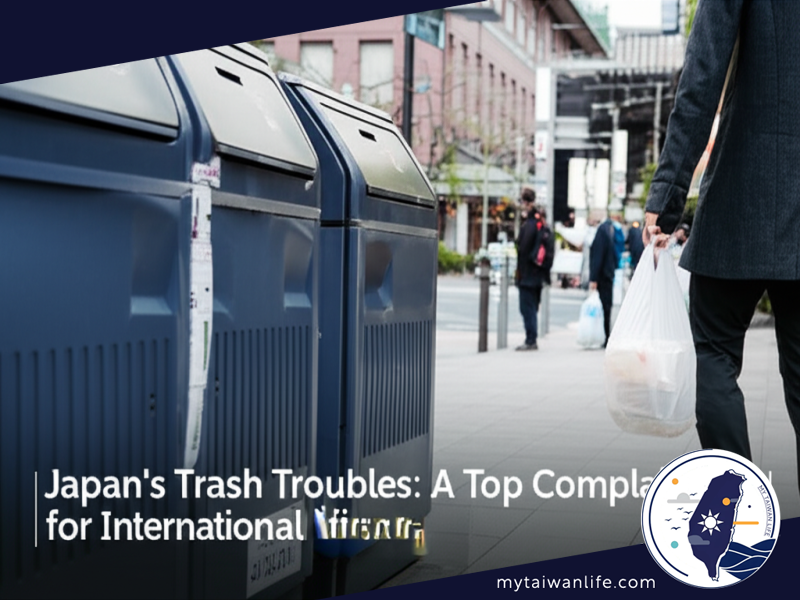Japan's Trash Troubles: A Top Complaint for International Visitors
Lack of Public Trash Bins Frustrates Tourists, Survey Reveals

A recent government survey indicates that the absence of readily available trash bins in public spaces is the foremost inconvenience reported by visitors to Japan, including at key locations like train stations. This issue has emerged as a significant point of concern for those traveling through the country.
The Japan Tourism Agency's findings, based on a survey of over 4,000 international visitors at five major airports, revealed that 21.9 percent identified the lack of trash receptacles as their primary frustration. This survey encompassed individuals departing from New Chitose, Narita, Haneda, Kansai, and Fukuoka airports between December and January.
While the percentage expressing this concern has improved slightly from the previous year, a substantial portion of respondents still noted the necessity to carry their refuse back to their accommodations due to the lack of disposal options.
Experts suggest that the reduction in public trash bins in Japan is linked to increased security measures following incidents such as the 1995 Tokyo subway sarin gas attack and the 2004 Madrid train bombings. These measures aimed to mitigate potential threats, resulting in the removal of many bins.
However, this trend has inadvertently contributed to littering concerns at various tourist destinations, raising broader public issues.
Yohei Takemura, CEO of Forcetec Inc., a company specializing in solar-powered, trash-compressing bins, highlighted the discrepancy, noting that cities like New York and Paris maintain approximately 30,000 public trash bins. He observed that while publicly maintained bins have diminished in places like Tokyo, some privately-operated alternatives exist.
Other challenges mentioned by visitors included communication difficulties (15.2 percent) due to limited English proficiency among staff in restaurants and other facilities, and overcrowding at popular tourist sites (13.1 percent). The survey also addressed issues related to immigration procedures, particularly the prolonged waiting periods at airports.
Other Versions
Los problemas de la basura en Japón: Una de las principales quejas de los visitantes internacionales
Les problèmes d'ordures au Japon : Une des principales plaintes des visiteurs internationaux
Masalah Sampah di Jepang: Keluhan Terbanyak bagi Pengunjung Internasional
I problemi della spazzatura in Giappone: Una delle principali lamentele dei visitatori internazionali
日本のゴミ問題:外国人観光客の不満トップ
일본의 쓰레기 문제: 외국인 방문객의 가장 큰 불만 사항
Mga Suliranin sa Basura sa Japan: Isang Pangunahing Reklamo para sa mga Bisitang Internasyonal
Мусорные проблемы Японии: Главная жалоба иностранных туристов
ปัญหาขยะในญี่ปุ่น: ข้อร้องเรียนอันดับต้นๆ สำหรับนักท่องเที่ยวต่างชาติ
Vấn Đề Rác Thải của Nhật Bản: Khiếu Nại Hàng Đầu của Du Khách Quốc Tế
Categories
Warning: Undefined array key "article_category" in /web/htdocs/www.mytaiwanlife.com/home/news/sidebar.php on line 125
Deprecated: html_entity_decode(): Passing null to parameter #1 ($string) of type string is deprecated in /web/htdocs/www.mytaiwanlife.com/home/news/sidebar.php on line 125
Warning: Undefined array key "article_category" in /web/htdocs/www.mytaiwanlife.com/home/news/sidebar.php on line 125
Deprecated: html_entity_decode(): Passing null to parameter #1 ($string) of type string is deprecated in /web/htdocs/www.mytaiwanlife.com/home/news/sidebar.php on line 125
Warning: Undefined array key "article_category" in /web/htdocs/www.mytaiwanlife.com/home/news/sidebar.php on line 125
Deprecated: html_entity_decode(): Passing null to parameter #1 ($string) of type string is deprecated in /web/htdocs/www.mytaiwanlife.com/home/news/sidebar.php on line 125
Warning: Undefined array key "article_category" in /web/htdocs/www.mytaiwanlife.com/home/news/sidebar.php on line 125
Deprecated: html_entity_decode(): Passing null to parameter #1 ($string) of type string is deprecated in /web/htdocs/www.mytaiwanlife.com/home/news/sidebar.php on line 125
Warning: Undefined array key "article_category" in /web/htdocs/www.mytaiwanlife.com/home/news/sidebar.php on line 125
Deprecated: html_entity_decode(): Passing null to parameter #1 ($string) of type string is deprecated in /web/htdocs/www.mytaiwanlife.com/home/news/sidebar.php on line 125
Warning: Undefined array key "article_category" in /web/htdocs/www.mytaiwanlife.com/home/news/sidebar.php on line 125
Deprecated: html_entity_decode(): Passing null to parameter #1 ($string) of type string is deprecated in /web/htdocs/www.mytaiwanlife.com/home/news/sidebar.php on line 125

